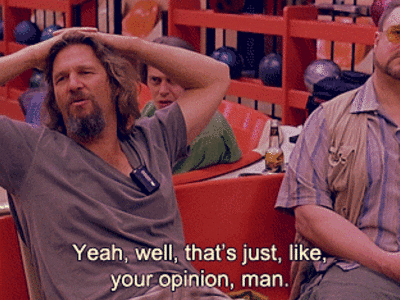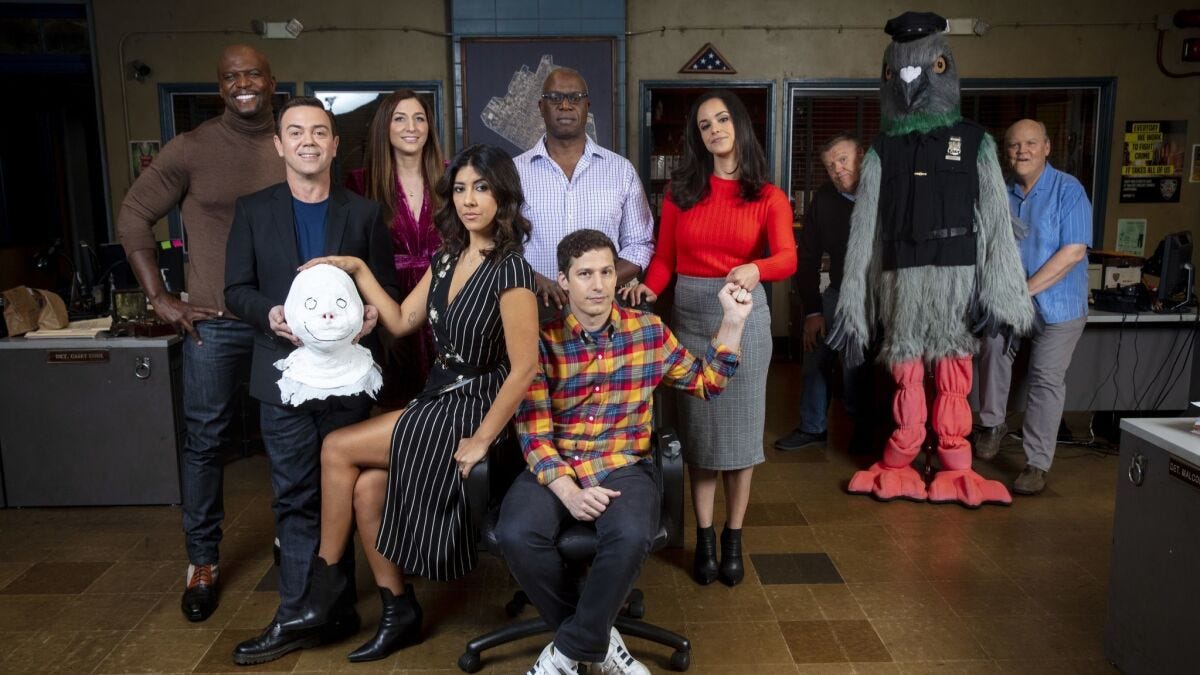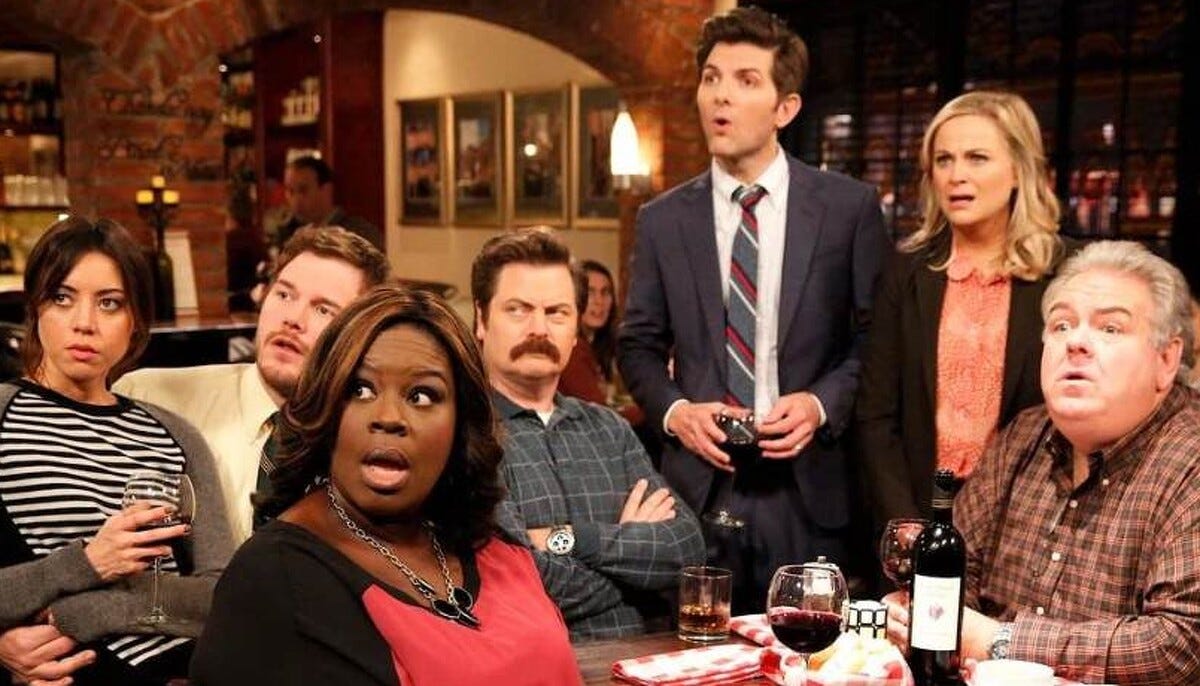Weight Watching Part 1: Showing v Telling on Network Television
A tale of two sitcoms
Here’s the big content warning/ disclaimer/ acknowledgement of my privilege: body positivity, fat activism and plus-size representation are interests of mine. However, they are not my areas of expertise. I do not and have never experienced anti-fat bias, nor studied it seriously.
This is the first of two essays on depictions of fatness in media that have made me Think over the years. Today: TV. Next week: stage and film. If you find frank discussion (using all the words, even the mean ones) of this topic uncomfortable, go ahead and skip. If you think I’m not qualified to even write this, tell me off in the comments.
Just don’t say I didn’t warn you or own up to the fact that this is all just my opinion, man.
Okay cool!
Sometimes people with the best of intentions get it wrong. Take the viral tweet about how Jason Alexander was considered “comically obese” in the 90s. As many pointed out, George Costanza wasn’t a hunk, but he was never considered “comically obese,” either by the culture or as a source of humor on Seinfeld. This tweeter thought they smelled anti-fatness and jumped to conclusions, inadvertently fat-shaming Jason Alexander, and being kind of mean to the Seinfeld writers, and viewers, and maybe the entire decade of the 1990s.
Still, it got me thinking, something I try never to do but sometimes cannot be avoided. There should be a more nuanced and, frankly, smarter re-evaluation of how fatness and fat bodies have been treated on sitcoms, and at the risk of putting my straight-sized ass in the middle of a conversation that didn’t ask for my input…I’m gonna do it!
Specifically, a case study of two good-hearted recent sitcoms, and how I think they hit and miss the mark: Brooklyn 99 vs. Parks and Recreation.
(Why these two shows? No reason, except that I’ve seen them both, they have a lot in common structurally/superficially, and they aired around the same time. They’re not meant to represent either end of any spectrum; you can find “better” and “worse” examples elsewhere. This is just what makes sense to moi.)
Parks and Recreation and Brooklyn 99 share executive producers/creators, a setting (government workplace) and an ethos: nice people in a flawed system. In one, idealistic Leslie’s ambitions are undermined by her surly boss Ron; in the other, goofy Jake’s jocular attitude is straightened out by his by-the-book boss Captain Holt. I wanna be clear that I love both of these shows and if you’re an adult with a moral compass, you can watch either one and come out the other side a decent person. But as far as the particular issue of anti-fatness, I’m ready to declare a winner, and it may not be the one you think.
Brooklyn 99, the slightly more recent of the two comedies, was also the more, for lack of a better term, woke. It’s certainly more diverse. Two Latina leads, one of whom is bi. Two Black male leads, one of whom is gay. The criminals tended to be white (Irish, Russian and Italian mobsters), and when the show needed a Black car thief, it made him incredibly charming. Pontiac Bandit 5ever. This was a show you could feel good about watching.
(side note: if this sounds good but you don’t love the whole “cops” part, or you’ve already seen it and want something with a similar vibe, I am on my hands and knees begging you to check out Superstore.)
But it had a blind spot: body size.
As Jenna Guillaume wrote for Buzzfeed in a listicle addressing this topic on TV more broadly:
Brooklyn 99 is hailed by many as a progressive unicorn of a sitcom, which makes the pervasive anti-fatness all the more glaring and hurtful. The most egregious example, of course, is Fat Terry, played by Terry Crews in a fat suit, but the bumbling portrayal of Hitchcock and Scully also sucks.
Terry’s compulsive exercise (which replaced his compulsive eating, necessitating the fat suit when he relapses on cacao nibs) is, at least, a story, if not a particularly original one (you might remember Monica on Friends replacing adolescent snacking with fastidious organization and cleaning, or Schmidt on New Girl also replacing adolescent snacking with fastidious organization and cleaning. They used fat suits, too).
Hitchcock and Scully, on the other hand, were one note, played over and over, ad infinitum. They were supposed to be, I think, a satire of old-school cops gone to seed, or maybe the way mediocre white men were allowed to continually fail up until…yesterday. They fall asleep during meetings, make off-color comments and never leave the precinct. And there’s no bigger source of humor than their eating habits. Their food obsession is cartoonish, as they lust after vending machine candy and microwavable garlic bread and street hot dogs. They respond with a Pavlovian mindlessness to cookies. Do I even need to tell you both actors are fat?
Their accomplishments are continually undercut by their bodies. They save the day…by knowing how to get around while stuck in a chair. They find a terrorist…because they know the layout of the city’s food carts. A flashback episode shows that they actually do have detective skills. It also shows they used to be hot, before they started eating chicken wings. And now they’re old and big, LOL, get it?
Hitchcock and Scully embody every negative assumption our society has about fat people: lazy, indulgent, stupid.
I don’t think the writers meant to be, like, mean. Hitchcock and Scully are minor characters, they’re old white men, it’s okay to make fun of them, right? But even minor characters should have some depth, and the show was so careful to avoid shortcuts elsewhere.
Brooklyn 99 was obvious about its politics as it covered everything from racial profiling to homophobia, #metoo, immigration and prison reform. And that was all before 2020 happened and the show scrapped and rewrote its entire final season. (a cool and progressive and brave move!)
The show preached, “we should treat everyone equally.” But it demonstrated a clear bias when it came to weight. Parks and Recreation did the exact opposite.
What you have to remember is that when Parks premiered in 2009, “obesity epidemic” panic was at an all-time high, including some especially troubling fear-mongering about childhood obesity. This was the era of My 600-lb Life and that scary lady on The Biggest Loser. The FDA fucked with the food pyramid. Obama, Oprah and Bloomberg were all on the anti-obesity train. (Please listen to the “Maintenance Phase” episode on this topic if you need a reminder, or an explainer about why the whole brouhaha was bullshit.) Point is, Parks did not exist in a vacuum. “Fatness is an immediate and political issue” was a widely-held belief, and not necessarily a conservative one.
Pawnee, the fictional Indiana town where Parks is set, parodied the worst of middle America: Ignorant. Unengaged. Fat. (This is three years post-Idiocracy, if that paints a picture of the country’s self-image.) Within that setting, the show took aim at, usually, the right targets. As the debate over gay marriage raged, Parks introduced Marcia and Marshall Langman from the Society for Family Stability Foundation, a hysterical right-wing Christian activist group. The local Pawnee news media is always either interrupting or sensationalizing the real story, until Leslie has to show her butt on camera to put a sex scandal to bed. Viewers are continually reminded that the land Pawnee is on was stolen from the native Wamapoke Tribe, and the blame for the atrocities of colonization is placed squarely on the white settlers.
Buuuuut then there’s the weight stuff. (Sensing a pattern? Smart comedy writers fall into cultural traps too.) At the center of Pawnee’s economy is candy factory Sweetums, which hides sugar in energy bars and subsidizes a special “fat [roller] coaster” for “plus-sized citizens” at a festival. As one character remarks, “you must be this wide to ride!” A popular local fast food chain is “Paunch Burger,” whose logo is the silhouette of a heavyset man. Their specialty is a dish called the “Greasy Lard Bomb.” The town motto is “First in Friendship, Fourth in Obesity.”
The characters justify their crusade with the oldest trick in the book: the health argument. Diabetes is a problem in Pawnee, therefore constantly harping on the population’s weight is a totally normal thing for the…Parks and Recreation department.
Sure, you could say this is all making fun of “America,” where cheap is better than nutritious and immediate gratification is king. In a very good episode, health nut Chris tries to reform the commissary menu, only to find that even cheap beef is tastier than gourmet turkey, and relents. And in fairness, the show poked plenty of fun at health crazes, too. There are jokes about cleanses and kale in milkshakes and vodka shots served as a flash of light. Chris looks stupid in his cross-trainers with toes (remember those?) and won’t shut up about chia seeds or whatever. In a later season, we meet a Goop-like lifestyle influencer. There is, I guess, balance. But since no one’s been discriminated against by the medical establishment because they love tofu too much, you can’t really call it equal.
There are some truly mean anti-fat jokes in Parks. I’ll just print one: “Pawnee is the fourth most obese city in America. The kids here are just beefy. They're husky, big-boned, chunk monsters. I call ‘em like I see ‘em.” That’s from Ann, a nurse. The nice girl. About children!!!!!
I wish the show had made hay out of the obesity panic, rather than the obese, just like it ripped apart so many other drummed-up political scares (there’s an episode about fluoride in the water and another about censorship in art. And a great one about gay penguins!). But the culture wasn’t there yet. It happens.
The context of the 2010s won’t matter if and when Internet clout-chasers find enough screen-caps of objectionable lines to declare Parks #bad. I can’t control that. But while I have your attention — and I swear I’m almost done — let me propose another way of watching the show. Not a defense but a different interpretation that hinges on one key storytelling element:
We never actually meet any of these horrible obese people. A woman at a town meeting complains about her heavy husband; he’s not there. The show doesn’t fat-shame an actual child (which would have been cruel and unethical casting, IMHO). There’s no visual spectacle of being too big for a chair or too heavy to sit on Santa’s lap. No one ever wears a fat suit. Referencing that paradigm that “fat people are a problem” is common, but truly dehumanizing scenes are totally absent.
What about the fat Pawnee-ans we do see? Like Brooklyn 99, the Parks office employs two fat minor characters…
Jerry, at first glance, is a lot like Hitchcock and Scully. He’s an older white guy who’s quasi-incompetent at his job and farts a lot. It’s implied that his size slows down a golf cart and no one’s quite sure how he landed a hot wife (played by Christie Brinkley). But unlike Hitchcock and Scully, Jerry is much more than a punching bag. He has a personality. In his own way, he’s a very hard worker, and he’s no more food-obsessed than anyone else from Pawnee. He’s a loyal friend who likes mystery novels and painting nature scenes. His co-workers may openly mock him, but the show itself doesn’t question his happy, gorgeous family. It never implies that the other Gergiches are in some way “unattractive” by association. His brood is just as legit as Ron’s ridiculously rugged lineage or Tom’s over-the-top lifestyle. All of this is to say, Jerry’s a real guy who just happens to be heavy. He isn’t Weight Personified.
(Canonically, Jerry has an enormous penis, which may explain some of the attraction.)
And then there’s Donna.
Donna “do I look like I drink water?” Meagle.
Donna who has one firefighter in her bathtub and another waiting in her Benz (“don’t worry, I rolled the window down”). Donna who definitely fucked Jean-Ralphio (they exchange a pointed look in a later episode…have I mentioned I’ve watched this show a bunch?). Donna who co-created Treat Yo’self Day. Donna who ends up with perfect schoolteacher Joe (Keegan-Michael Key). Oh, how Joe longs to see Donna “in that red thing.” Her response: “You will see me in that red thing when you deserve to see me in that red thing.”
We do not deserve Donna.
The existence of Donna and Jerry doesn’t negate the iffier stuff on Parks, but for me, if it’s a choice between the carefully curated, politically correct humor of Brooklyn 99 that somewhat fails certain characters versus a show that lets fat people have a ton of fun, even in a world that demeans them, I pick Parks. Long after soda tax jokes have grown stale and we’ve all stopped eating beef for environmental reasons, we will still have the lesson of Jerry Dinner: the guy at the office you make fun of throws the best party in town. Brooklyn 99 offered platitudes; Parks offered empathy.
It’s your classic showing vs. telling. Brooklyn 99 told us to care about everyone, then showed us it’s fine to mock certain people. Parks told us to pity those same people, then showed us examples we couldn’t help but love. Both had failures and successes, but if you’ve taken any writing class, you know showing > telling. It’s like a law.
If anything about Parks or Brooklyn 99 turns you off, that’s valid. Network sitcoms are by design a medium for the masses, and your opinion is every bit as legit as mine. Buuuuut this is my takeaway, because we really are at the end and I have to have some sort of conclusion besides picking a winner…
What if it really is that simple? What if, in addition to the (necessary) debates over word choices in dialogue or whether a certain joke is “punching up” or “punching down,” what if the best thing writers can do is craft compelling, funny, interesting characters and then just…let people above a size 18 audition?
eh???????????????????????????????????????????
Maybe that’s super obvious and I’m the last person alive to get it. But I’m satisfied to finally put my finger on why some shows gimme the ick and others less so. If you have a different metric, I’d love to hear about it.
Until I get into it all over again next week, remember, diets are scams, Noom is evil, the BMI is fake, hypertension is just an asshole way of saying high blood pressure, and MSG is fine.
Keep it real,
Lizzie




